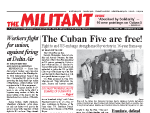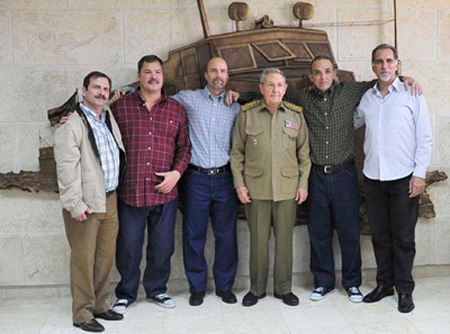BY MAGGIE TROWE
The Cuban Five are free.
Gerardo Hernández, Ramón Labañino and Antonio Guerrero, the three members of the Cuban Five remaining in U.S. prisons, returned to Cuba to a hero’s welcome Dec. 17. The five Cuban revolutionaries were arrested and railroaded to jail in the U.S. in 1998. (The story of the frame-up of the Five and the fight for their freedom is told in a special feature on pages 6-8.)
“As Fidel promised in June 2001 when he said, ‘They will return,’ Gerardo, Ramón and Antonio arrived in our homeland today,” said Cuban President Raúl Castro at a Dec. 17 press conference in Havana, at the same time U.S. President Barack Obama spoke to the press at the White House.
Castro thanked all those who had fought to free the Five. “The enormous joy of their families and our whole people, who mobilized tirelessly for this day, is extended to the hundreds of committees and solidarity groups; to the governments, parliaments, organizations, institutions and personalities who for these 16 years demanded and fought hard for their freedom,” said Castro.
Cuba and the U.S. have agreed to resume diplomatic relations, Castro said. “This does not mean that the heart of the matter has been resolved,” the Cuban leader continued. “The economic, commercial, and financial blockade, which causes enormous human and economic damage to our country, must cease.”
He reaffirmed the Cuban government’s willingness to discuss “issues related to national sovereignty, democracy, human rights and foreign policy” with Washington, in spite of “profound differences” on these matters.
Obama referred to a “complicated history” between the two countries. It’s actually not complicated at all. It is the history of the U.S. propertied rulers’ class hatred for a revolution led by workers and farmers 90 miles away — and the unending economic, political, and military actions Washington has taken to punish Cuba’s toilers.
The Eisenhower administration imposed an economic and financial embargo on Cuba in October 1960, and every U.S. administration, Republican and Democratic, has upheld or intensified it. In 1992 and again in 1996 the embargo was tightened by legislation adopted by the U.S. Congress and signed into law by presidents George H.W. Bush and Bill Clinton.
President John Kennedy launched a mercenary invasion at the Bay of Pigs in 1961, which was routed by an armed people, and threatened to use nuclear bombs against Cuba in 1962. Since 1959 nearly 3,500 Cubans have been killed in attacks by counterrevolutionary Cuban-American paramilitary groups that operate on U.S. soil with impunity.
In exchange for freeing the three, the Cuban government released and sent to the U.S. a spy of Cuban origin. U.S. officials report that this person is Rolando Sarraff Trujillo, a former Cuban Ministry of the Interior cryptographer arrested in 1995 and sentenced to 25 years in jail. Obama said the agent provided critical assistance to the United States. According to the Office of the Director of National Intelligence, this includes information that led to the conviction of Defense Intelligence Agency senior analyst Ana Belen Montes in 2002, former Department of State official Walter Kendall Myers and his spouse Gwendolyn Myers in 2010, and members of the ‘Wasp Network’ in Florida, including members of the Cuban Five.
According to the Washington Post, “the Wasp Network has been credited with foiling a 1994 plot to set off bombs” in the well-known Tropicana nightclub in Havana. Other attacks succeeded, including three bombs set off in Havana hotels Sept. 4, 1997, one of which killed Italian-Canadian businessman Fabio di Celmo.
Castro announced that for humanitarian reasons Cuba had released Alan Gross, a U.S. citizen imprisoned in 2009 for distributing sophisticated satellite equipment in Cuba to counterrevolutionaries as part of U.S. operations to create a covert high-speed Internet network there. Cuba also unilaterally released 53 individuals in whom Washington, according to Raúl Castro, “had shown interest.”
Gross, his family and U.S. officials have claimed he was in dangerously deteriorating health. His supporters asserted he was ill-treated, had lost weight and was severely ill with cancer, arthritis and other ailments. However, Rabbi Elie Abadie, a professor at Yeshiva University and a practicing physician in New York who visited Gross in Cuba two years ago and examined him at the family’s request, told CNN that Gross was in good health and cancer-free, and noted that Gross walked down the plane ramp with ease.
While in Cuba, Gross refused medical and dental care.
“We will end an outdated approach that for decades has failed to advance our interests. And instead we will begin to normalize relations between our two countries,” Obama said, adding he had instructed Secretary of State John Kerry to “review Cuba’s designation as a state sponsor of terrorism.” He said the administration is “taking steps to increase travel, commerce and the flow of information to and from Cuba.”
According to the White House website, the new regulations will raise the amount of money U.S. residents may send to Cuba, permit the use of U.S. credit and debit cards in Cuba, facilitate the processing of authorized financial transactions and open the way for increased commercial sales and exports of goods and services to Cuba, including building materials for entrepreneurs and private residences, communications hardware and business training.
While most travel to Cuba is still prohibited, those who plan visits under 12 specific categories — including family visits, journalistic activity, professional, educational and religious activities — will be covered by general licenses and will no longer have to apply individually, the Obama administration says.
The agreement had been in the works for some time, with involvement of the Vatican and the Canadian government, both Castro and Obama said. A number of editorials in the New York Times in recent weeks called for an end to the embargo and a prisoner swap.
After the announcements, a Dec. 18 Wall Street Journal editorial said that while the paper has called for ending the embargo for 20 years, the overall course presented by Obama represents an indefensible “attempt to rehabilitate Cuba as an ordinary state.” The Washington Post in an editorial sharply opposed the Obama administration moves, saying they had given “a 50-year-old failed regime a new lease on life.”
Conduct of the Five
The conduct of the Five on trial and in prison won them respect and support, and inspired working people around the world. They acted with dignity and firmness, insisted on their innocence on the frame-up charges and said they were proud of defending Cuba and would do it again.
Refusing to plea bargain for more lenient sentences, they fought for a public trial in a venue where they could be judged by anything approaching an impartial jury. They maintained their revolutionary commitment, carried out a massive correspondence and reached out to fighters inside and outside the prison walls. Hernández corresponded with Cuban medical volunteers fighting Ebola in west Africa.
The release of the Cuban heroes took place as activities to free the Five were expanding, from the United States to Bangladesh to Cambodia to Greece to the United Kingdom.
More workers and others were being drawn to their fight, and to the Cuban Revolution itself, as they joined in labor actions demanding Walmart and other employers pay $15 an hour, street actions against police brutality and other protests generated by the growing crisis of capitalism.
As the news of the release of Hernández, Labañino and Guerrero spread in Cuba, spontaneous celebrations broke out across the island. When the three arrived, they were met by Raúl Castro, their immediate families and their two comrades who had been released earlier, René González and Fernando González. Hernández told Castro the five were ready for whatever assignment comes next.
Related articles:
Emulate, defend Cuban Revolution
‘An example of what it means to be a revolutionary’
Absolved by Solidarity: 16 watercolors for 16 years of unjust imprisonment
|
Printer-friendly version of this article |














